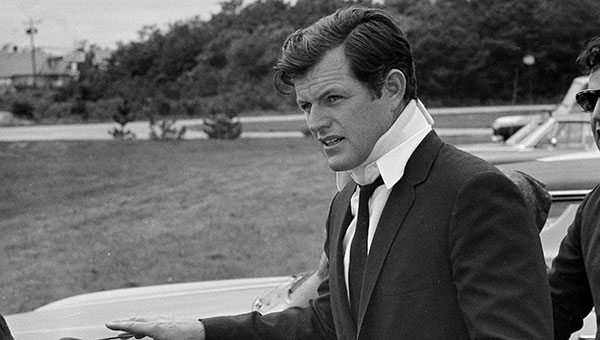 The new movie Chappaquiddick reminds us of an uncomfortable fact: There was a time when powerful politicians could get away with serious stuff. Or at least they could if their name was Kennedy and the stuff happened in Massachusetts.
The new movie Chappaquiddick reminds us of an uncomfortable fact: There was a time when powerful politicians could get away with serious stuff. Or at least they could if their name was Kennedy and the stuff happened in Massachusetts.
The basic outline is clear.
On the evening of Friday, July 18, 1969, there was a party at a cottage on Chappaquiddick Island. The guests were U.S. Senator Edward Kennedy, five other men and six younger women. All but one of the men were married and the women were single.
Late in the evening, Kennedy left the party with one of the women – Mary Jo Kopechne – ostensibly to drive to the ferry and return to lodgings in Edgartown. However, after purportedly taking a wrong turn, the car went off a bridge and submerged. Kennedy got free but Kopechne didn’t.
Kennedy claimed to have made several futile efforts to extricate her.
He then walked back to the cottage, passing a number of houses en route, enlisted two of the male guests and returned to the accident scene. The men – Joseph Gargan and Paul Markham – made several unsuccessful rescue attempts. Kennedy then swam across the channel and went to his motel while Gargan and Markham returned to the cottage. No mention of what had happened was made to the other guests and no accident was reported to the police.
The following morning, as Kennedy chatted with another motel guest about upcoming yacht races, the receding tide exposed the vehicle and Kopechne’s body was recovered by a diver.
Grimly, the body’s position gave rise to the suggestion that, thanks to an air bubble, Kopechne might have survived for several hours before succumbing to asphyxiation. If so, perhaps she could have been saved had Kennedy immediately summoned help.
John Farrar, the diver who recovered the body, certainly thought so. To quote: “I could have had her out of that car 25 minutes after I got the call. But he didn’t call.”
Finally, approximately 10 hours after the accident, Kennedy reported it to the police. Then he disappeared into the family compound in Hyannis Port.
A case has been made that Kennedy’s behaviour can be explained by some combination of physical and emotional trauma attributable to the accident. Indeed, while proclaiming his insistence on taking responsibility, Kennedy raised that very point in a TV address the following week.
Still, the overwhelming impression conveyed by Kennedy and those around him was that the primary objective was to limit the damage to his reputation and thus salvage his political prospects. Surrounded by loyally deferential courtiers, Kennedy was the heir apparent who was supposed to restore the White House to its rightful ownership. Kopechne’s death was tragic but it couldn’t be allowed to interfere with the political play.
The Massachusetts justice system was seized with incuriosity. Although Kennedy’s story had its fair share of inconsistencies and improbabilities, the authorities weren’t especially interested.
The partygoers were allowed to slip away without being questioned and no autopsy was performed on Kopechne’s body. Kennedy was allowed to quickly plead guilty to leaving the scene of an accident, thus avoiding questioning in open court. For this, he received a two-month suspended sentence. Then the January 1970 inquest was closed to the press and its contents were kept from the April 1970 grand jury.
It was only after the grand jury was disbanded and the case closed that the inquest transcript was published. In it, the judge noted his belief that Kennedy had likely committed perjury and also probably “operated his motor vehicle negligently … and that such operation appears to have contributed to the death of Mary Jo Kopechne.”
But as far as Massachusetts law was concerned, he was free as a bird.
The conventional wisdom is that, absent Chappaquiddick, Kennedy would have challenged President Richard Nixon in the 1972 U.S. election. I’m skeptical of that.
Presidential incumbents usually win re-election and Nixon was quite adept politically. Further, Nixon was on something of a high going into 1972. American involvement in Vietnam was clearly being wound down, there was the lauded opening to China and, even if ill considered, his wage and price controls satisfied the imperative of appearing to do something about inflation.
Contrary to legend, the Kennedys weren’t huge political risk takers. Personal behaviour was a different matter entirely.
Troy Media columnist Pat Murphy casts a history buff’s eye at the goings-on in our world. Never cynical – well, perhaps just a little bit.
The views, opinions and positions expressed by columnists and contributors are the author’s alone. They do not inherently or expressly reflect the views, opinions and/or positions of our publication.

